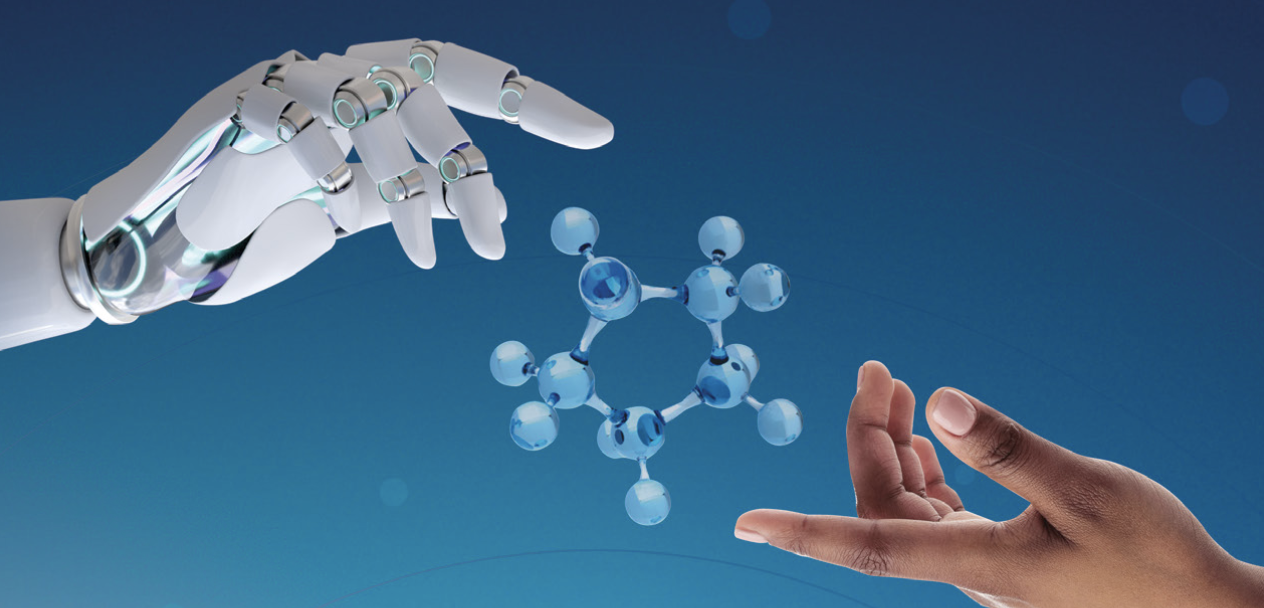“We need a national facility that enables anyone to join the search for next-generation molecules that can change the world.”
This was the resounding message delivered by more than 200 participants from 17 states and 6 countries engaged in an intensive, two-day brainstorming session at the University of Illinois at Urbana-Champaign during the summer of 2022. The National Science Foundation sponsored the workshop, and participants included chemists, scientists from other fields, and many non-specialists.
The heart of the matter was clear: The world desperately needs new molecules with new functions, and we need a first-of-its-kind infrastructure to help find them.
Workshop participants agreed that the possibilities are endless, and they mentioned specific ideas that engendered exceptional levels of interest. Among the ideas were new materials, both stable and efficient, for converting sunlight to storable energy; new therapeutics to combat intractable cancers that disproportionally affect marginalized groups; and new chemistry that opens new frontiers for further advanced functional discovery in the future.
A key concept at the workshop was to start with a desired function and then discover a molecule that meets this need. Workshop attendees also stressed that this should be a mission-oriented facility, providing an innovative infrastructure for teams of researchers to collaborate to drive frontier molecular innovation in ways never thought possible. What’s more, anyone should be able to participate in this exciting process.
The workshop explored the use of automation and AI in chemical synthesis, which creates a unique partnership between humans and machines. Automation frees scientists from the mechanical aspects so they can concentrate on ideas and innovation, while AI puts high-speed analysis at chemists’ fingertips.
The gathered community also suggested that the new facility give a high priority to collaborations with non-specialists; it should aim to democratize molecule-making by tapping into the imaginations of citizen scientists from around the world, and thereby broadly enabling the creation of a highly diverse molecular innovation workforce for the future.
Some pointed out that democratization has happened in other scientific fields, and it can happen in chemistry. NASA enlists thousands of people from around the world, and their citizen scientists have discovered new planets and comets. Computer science has also successfully been democratized, teaching computer programming to kids as young as third grade through groundbreaking platforms such as Scratch. If anyone can find new planets, and if anyone can code, then anyone can help in the search for new molecules.
As chemistry opens its doors to wider participation, the group at the two-day workshop recognized the need for forward-looking safety and ethical protocols. A spokesperson from a leading biotechnology company, Ginkgo Bioworks, talked to the attendees about how they have grappled with these very issues in the synthetic biology space, providing an inspiring roadmap for success.
By inviting outside speakers to share their experiences, workshop planners took a unique approach—learning by analogy. To discover how people from disparate fields have wrestled with similar challenges, workshop planners also brought in speakers from Aero, an innovative new airline; Sony AI; and even Minecraft, the worldwide gaming sensation.
Workshop participants envisioned the National Facility for Automated Chemical Synthesis and Democratized Molecular Innovation to be a facility like no other. Therefore, in the same spirit of innovation, the following Planning Workshop Proceedings will break the traditional mold. The main workshop talks, as well as the ideas that flowed in breakout sessions, are captured in a series of engaging feature stories, with a list of key takeaways at the end.
As ideas ricocheted around the workshop, one of the participants suddenly exclaimed, “So you’re aiming to build a James Webb Telescope for chemistry!” The analogy was fitting. The James Webb Telescope, launched on December 25, 2021, is the most powerful telescope in space. Originally named the Next Generation Telescope, it has the resolution and sensitivity to pick up objects too old, distant, or faint for the Hubble Telescope to see. It allows astronomers to stare deeper into space than ever before.
Similarly, workshop participants dreamed together of a National Facility for Automated Chemical Synthesis and Democratized Molecular Innovation, which will enable chemists to probe deeper into chemical space than ever before. After two transformative days, the group vigorously concluded that we simply had to build this next-generation molecular function-generating facility to broadly empower the discovery of tomorrow’s molecular solutions. It will have a transformative impact on our society.
Access the full proceedings here.
